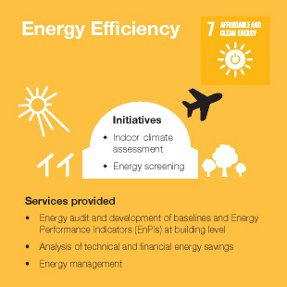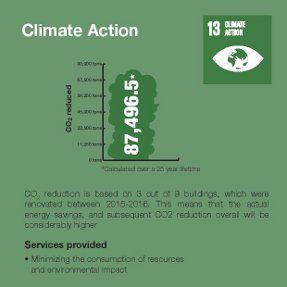Achiving, Measuring, and Tracking Sustainable Impact
The business case for sustainability is well established, with sustainable business leaders citing growth and new business opportunities as reasons for tackling sustainability challenges.
Achieving the Sustainable Development Goals (SDGs) is projected to create market opportunities worth up to 12 trillion USD a year for the private sector by 2030. Like ISO standards, the SDGs provide the opportunity for a robust compliance framework for sustainability, where impact is able to be measured easily and often, in a transparent way. Danish Energy Management & Esbensen has developed tools for sustainability management and measurement, which are used to track and report on progress towards the SDGs following UN standards.
This journey started over 30 years ago with design, planning and implementation projects in Denmark. The focus was then, as it is now, on sustainability, which led to a number of monitoring and evaluation projects. These projects provided the creation of indicators and IT systems, value chain monitoring and risk mitigation, and policy planning. These services eventually led to the monitoring of all EU projects in all sectors, and the establishment of the sister company Danish Management. Today both companies work side-by-side in a continuous effort to develop innovative consulting tools that enhance both energy and sustainability objectives. This experience has led to the creation of a new range of sustainability management and measurement services.
Working actively with the SDGs is regarded as a business opportunity for any business making a sustainable impact through their products and services. Outcomes achieved by these services are, among others: strengthening foresight management and anticipating compliance standards, stimulating product innovation, developing new market segments, increasing sales, improving operational efficiency and reducing employee turnover.
Services that contribute to these objectives start with a materiality assessment, mapping key Sustainable Development Goals and Targets. Once high impact SDGs and Targets are identifi ed, individualized SMART indicators can be established, which are easily measured and based on international standards. These indicators can form the basis for impact tracking reports, and can also be reported into an online SDG Reporting System, providing a consistent and easyto- use reporting mechanism that can create reports and be used for frequent reporting purposes.
Danish Energy Management & Esbensen now produces its own Impact Tracking Reports on a quarterly basis, offering the service world wide, and highlighting individual cases such as Energy Screening for the Danish Ministry of Defense, and Energy Effi ciency for State Owned Buildings in Melaka, Malaysia.
»Our values are aligned with the United Nations Sustainable Development Goals and the European Union’s 2030 and 2050 targets to reduce greenhouse gas emissions by at least 80 percent below 1990 levels by 2050.«
Jørn Lykou, CEO, Danish Energy Management & Esbensen

Energy Screening For the Danish Ministry of Defense
Danish Energy Management & Esbensen provided an energy audit and review for one of the establishments under the Danish Ministry of Defense which consumes particularly high amounts of energy due to e.g. large open hangers and buildings with large ventilation demand. This work provides the foundation for the Ministry to become more sustainable and save energy-related costs.
Energy audits were carried out with a particular focus on significant energy use, e.g. with relation to equipment and workflow. All audits were carried out with the guidance of a local employee who had detailed knowledge of the building, installations & workflow. An energy audit report was provided for each building individually, with Energy Performance Indicators (EnPls) and an action list identifying proposed energy efficiency measures to be taken.

Energy Efficiency for State Owned Buildings in Melaka, Malaysia
For the Melaka State Government, Danish Energy Management & Esbensen has been contracted to screen and analyze 9 State Buildings covering a total area of 155,000 m2. The Project is a pilot project to demonstrate the ESCO model for public buildings in practice. Based on the screenings done of the 9 buildings, a 20% savings is expected, with a total investment of app. 8 million USD.
In partnership with the Danish Climate Investment Fund, investment, finance and implementation for the project is covered under an Energy Performance Contract, where the Melaka State Government will repay the investment through the energy cost savings achieved. As such, there is no net cost for the state or the building occupants – it is all paid by the savings.
Danish Energy Management & Esbensen provides Energy Consultancy World Wide within the areas of Policy, Regulation, Finance, Institutional Development and Information and Communication.
About Us // Privacy Policy // Copyright Information // Legal Disclaimer // Contact
Copyright © 2012-2018 macondo publishing GmbH. All rights reserved.
The CSR Academy is an independent learning platform of the macondo publishing group.









